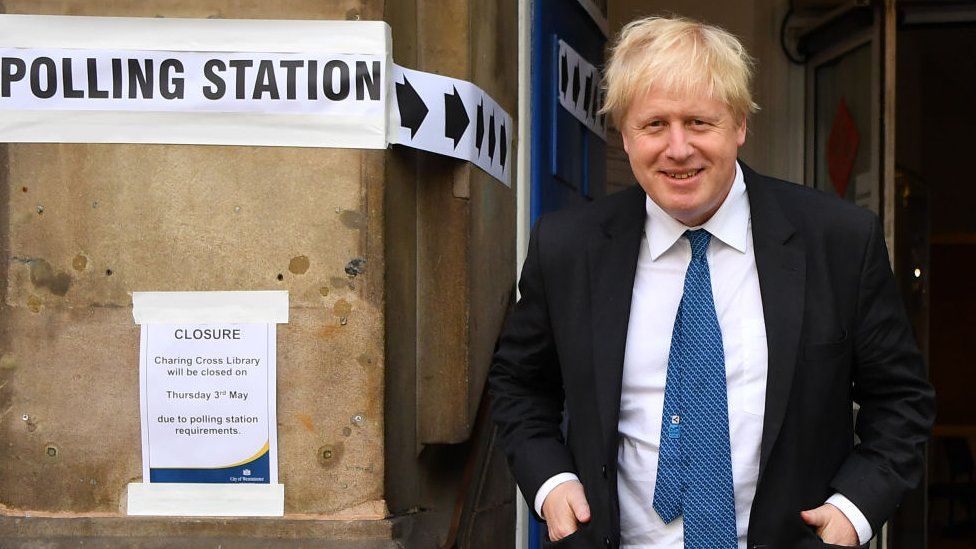Could there be an early general election?
- Published

MPs have rejected Prime Minister Boris Johnson's attempt to hold an early general election on 12 December.
But why does the PM want an election and what are his remaining options?
Why does Boris Johnson want an early election?
The next general election is not due until 2022, but the PM wants an early election to try to restore the Conservative Party's majority.
While an early election carries risks, Mr Johnson hopes to win more seats in the House of Commons, to make it easier to pass a Brexit deal.
How quickly can an election happen?
Once an election is called, there has to be a gap of at least five weeks before polling day.
That is because the law requires Parliament to dissolve 25 working days beforehand.
At this point, MPs lose their status and campaign for re-election, if they choose to stand again.
So, in order for polling day to take place on Mr Johnson's preferred date of 12 December, the election would have to be triggered before 6 November.
Why hasn't an election already been called?
Mr Johnson can't just decide to hold an early election. He needs the support of two-thirds of all MPs - at least 434. This is a legal requirement, set out under the Fixed-term Parliaments Act.
The latest rejection by MPs on Monday night comes after Mr Johnson lost two previous attempts last month to trigger an early election.
Labour says it will support an early election, but only once the risk of a no-deal Brexit is "off the table".
Had the PM secured enough votes, he would have then recommended the day of the election to the Queen.
Despite losing the vote, there are other options the government can pursue.
Bypass the Fixed-term Parliaments Act
The government plans to get round the two-thirds threshold by introducing a very short law that fixes the date of the election as 12 December.
The advantage of this route - from the government's point of view - is that it would only require a simple majority of MPs to support it rather than two-thirds. MPs are set to vote on it on Tuesday.
The SNP and Liberal Democrats had already discussed the idea of a similar bill - although they want a different date. Under their plan, both parties had said they would propose a law on Tuesday that sets an election for Monday 9 December - three days earlier than Mr Johnson's preferred date.
It is not yet clear if they might switch to support the government's bill.
If an election was held on 9 December, it would be the first time since 1931 that a UK election had not been held on a Thursday.
If an election was brought via this route - either for 9 or 12 December - it would need to clear all stages in the House of Commons and the House of Lords. There is also a risk the law could be altered if MPs or peers propose changes - such as allowing 16 and 17-year-olds to vote.
Labour calls a motion of no confidence
Rather than the government, it could be the opposition that initiates an early election. This could happen if Labour proposed a no-confidence vote.
This would give all MPs a vote on whether they wanted the current government to continue.
Only a simple majority would be needed.
If it succeeded, opposition parties would be allowed two weeks to come together to try to form an alternative government. If this happened, Mr Johnson would be expected to resign and a new prime minister would take over.
But if nothing was resolved during those two weeks, the Fixed-term Parliaments Act says a general election would be automatically triggered.
Under this scenario, an election would take place at least seven weeks after a no-confidence vote was passed. That's because two weeks would be taken up by opposition parties trying to form a government, plus a further five weeks to dissolve Parliament for the campaign.
This would leave 19 December as the earliest possible date - a week after Mr Johnson's preferred date.
Government calls a motion of no confidence in itself
If the government felt it had no other way of forcing an early election, it could in theory call a motion of no confidence in itself.
In order for it to succeed, Conservative MPs would have to vote to bring down their own government.
While such a tactic might appear extreme to outside observers, it would trigger an automatic early election - as long as opposition parties failed to form an alternative government within the 14 days.
As such, this option would be extremely high risk.
Brexit explained
Brexit - British exit - refers to the UK leaving the EU. A public vote was held in June 2016 to decide whether the UK should leave or remain.
- Published7 November 2023